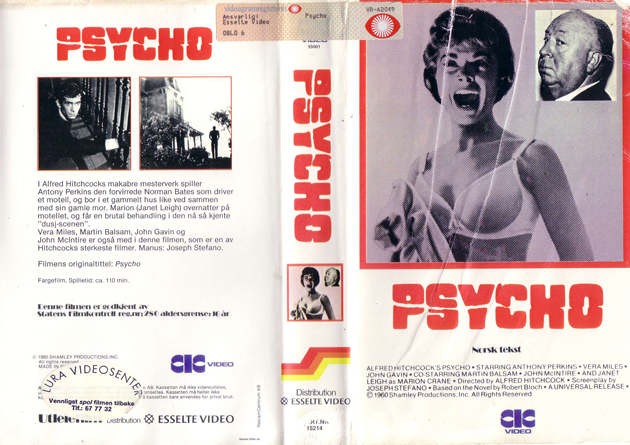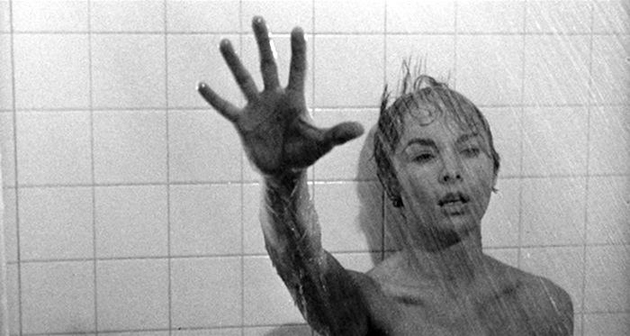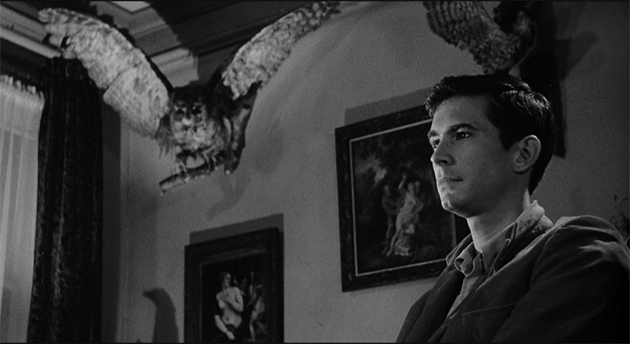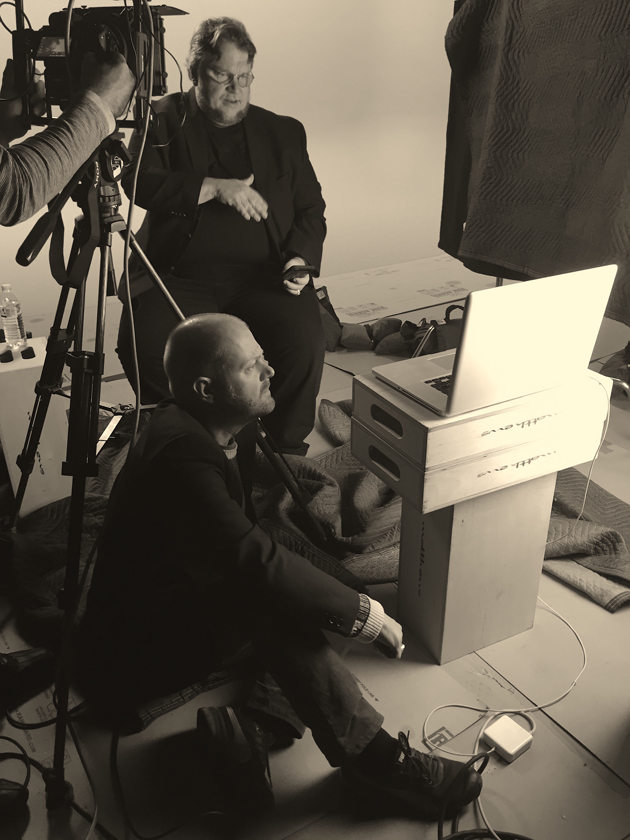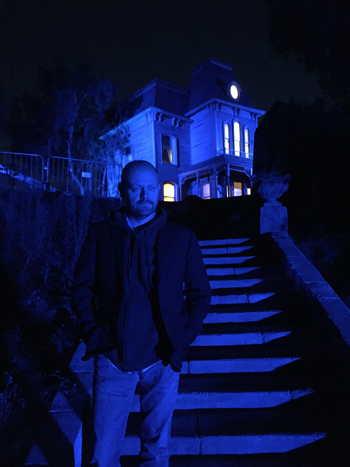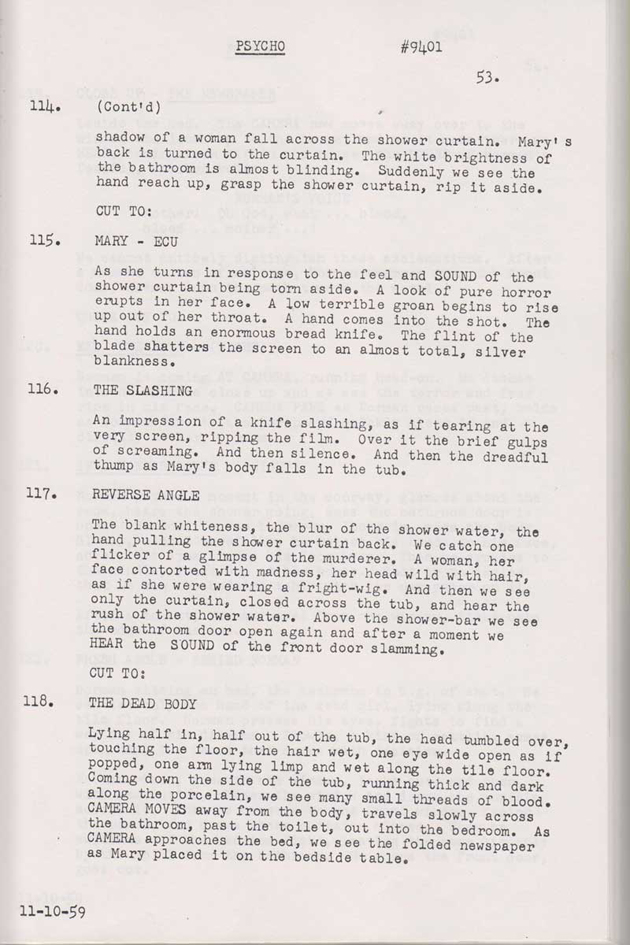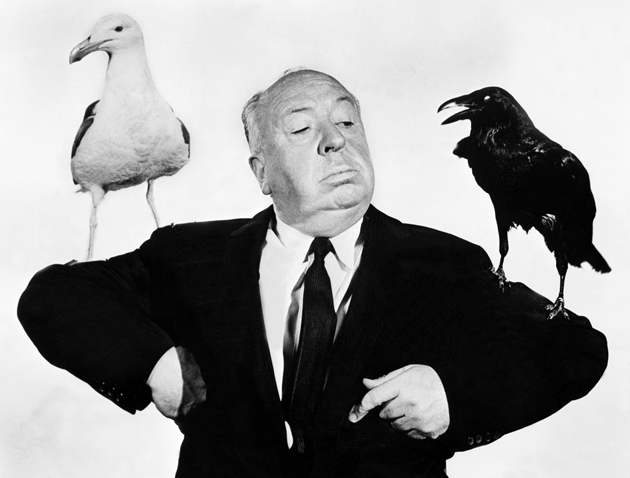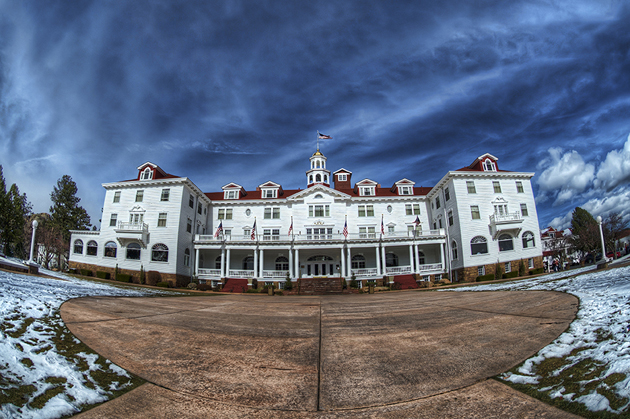Interview: Talking About Hitchcock, Showers, And Melons with 78/52 Director Alexandre O. Philippe
"Waitwaitwaitwaitwaitwait. YOU'RE the guy directing 78/52??? I saw some of that in Montreal back in July. I HAVE to talk to you!"










Let’s start at the beginning shall we? Where did the idea for 78/52 come from? I presume that it obviously came from a love for Hitchcock. How does it break down from Hitchcock to a specific scene? How do we get to that one scene?
For me the path really started when I was about ten years old. I have been really obsessed with Hitchcock since. I remember when I was ten to twelve years old, since my friends weren't I had to turn to my parents and their friends. I would host these weekly events at home and show Hitchcock movies on VHS. I would have a little speech and then have a little Q&A after. It was really the origins of that.
Then you fast forward to years later, of course, I have been doing Hitchcock workshops for a while now at film festivals and literary events. So I have always been fascinated by him as a craftsman and someone who thinks very, very actively about everything that he does in order to trigger very specific reaction from the audience. And that to me is art with a capital A. It bugs me that in his lifetime he hasn't gotten his due, the respect truly that he should have gotten, that he never won an Oscar in his lifetime is absurd. We all know he is one of the greatest if not the greatest of all time.
So his movies have always been movies that I would go back to. To look at and study. Vertigo is my favorite movie of all time, it is just an absolute masterpiece. The more that I study his craft the more I want to learn about it and the more I start deconstructing his movies.
The shower scene is the elephant in the room. It is the scene that everyone talks about to this day, and on so many levels. Not just technically, what's being achieved in terms of the editing and the music, and how revolutionary it was too. It broke some grounds not just for cinema or the genre but also culturally. It was Bret Easton Ellis who said It was a crack in the history of cinema.
Every documentary that I make there is this idea that hovers in the back of my mind for a while and it keeps coming. I didn't actively think, “I am going to make a doc about the shower scene”. And it was there, and it was there, it was there, and then one day I realized, “Oh yeah. This is of course something that I have to do. Because there is so much about that scene”. So the way that I am structuring the film right now my argument is that scene is, that it is Hitchcock's greatest trick. It encapsulates his genius, his fears, his obsessions. Its everything he was about. It's the culmination of his art. And not just of his, but of Bern Herman, Saul Bass, George Tomasini, Joe Stefano and all these extraordinary people.
So the movie really focuses on the scene and of course we look at the inception of it and he ran from being just one line, or actually a couple lines, in the Robert Bloch novel to this epic seven day shoot which I will make the argument that I strongly believe that Hitchcock made Psycho because he wanted to make the shower scene. Because he wanted to pull the rug from out of audiences feet and see how they would react. And then of course the production of it which is really fascinating.
We're about to interview Marli Renfro who is Janet Leigh's body double. I am going to get to interview Jamie Lee Curtis in about ten days so I am really hoping she will share some interesting tidbits about her mom (Janet Leigh). The centerpiece of the doc will be this epic deconstruction of it, shot by shot, almost kind of like Rashomon. We're going to go back over and over and over again but every time you go back you're going to see it differently. And then of course the reaction to it the impact and the legacy of that scene. Its an epic documentary about a two minute scene.
How long have you been working on it so far?
The fist first proposal was about two and half years ago and we decided to pull the trigger about a year and a half ago. And we have, it's hard to say right now, but we have probably eight or nine months of hard work, possibly more. My focus right now is to make the best film possible. Whatever happens, happens, in terms of release.
And in regards in who you're choosing to speak to. Obviously you want to speak to as many people as possible that we involved with the film.
Yeah there's not that many.
So what is your choosing process? Because there are certainly industry professionals - I saw a bit of this in Montreal and there are industry professionals and due to my own ignorance I didn't recognize them. Then I recognize that you have a lot of the young filmmakers in there as well. You've got the guys from Spectrevision (Elijah Wood, Josh Waller and Daniel Noah) and Aaron and Justin from Spring. You've got this wide spectrum of people that you got involved with their own opinions. Is there a choice on that? Who did you have in mind?
There is a top hit list, there are other choices that happen organically. It was very important to have young filmmakers because I don't want put that scene in amber and say, “look at this artifact”. I mean it is an artifact but it's also something that influences contemporary filmmakers. It was important for me to have that kind of filmmaker in the film to make the argument that it is still fresh and relevant today. Of course editors. We've interviewed a tonne of editors. What is amazing is that every single one will have completely different kind of take. They will obsess about certain cuts you wouldn't think of. I've discovered so many things just by talking to editors, showing me things that are really amazing that I cannot wait to reveal in the film itself. Of course some Hitchcock scholars and experts. Cultural experts as well. We had a phenomenal film historian that specializes in the 60s.
The painting that Norman removes from the wall has extraordinary significance. It's not just a painting. It's Susanna and the Elders, but it's not just any Susanna and the Elders. It is a particular version of Susanna and the Elders that says a tonne about what Hitchcock was doing. I had a 90 minute interview with an art historian just about that painting and the significance of that painting. We're going down the rabbit hole, or the shower drain as it were. I think a lot of it, you can get to the point of obsession where it gets dubious certainly, “Well did hitchcock really intend this?”
When great art happens there is a lot that is intentional and certainly there is always a lot of things that will happen just by chance. But in the case of Hitchcock there is so much that I think if you really start looking at the evidence you can say there is no way this was done by mistake. This was a guy who wasn't just talking to his art director, ‘Just put some paintings on the wall’. There was a real thought process about which painting and what he was going to do...
I'm going on a tangent here.
I’m trying to get as many big directors as I can. and also just because I am really curious to see where people take me. Like, how would David Lynch be in front of the shower scene, what would he show me? Or Jodorowsky? People like that. We’re working on Tarentino right now, it's... I'm hopeful it is going to happen. I feel like we're working so hard to get some of those people. Just to get this kaleidoscope of perspectives on it and I feel like everyone we've interviewed so far has brought so much to the table.
Spectrevision when we interviewed them they're obviously fans of Psycho and Hitchcock. When they walked in they said, ‘ We love your project. We think it's great. We just don't know how much we have to contribute’. I said, ‘Let's just talk’. That was a three and half hour interview. They were completely, completely into it, talking about Irreversible and Val Lewton and all these other movies. I think people have a lot more to say about it than they realize.
One cool thing. I received an email when we just started the project from a gentleman named Jeff Ford, ‘Hey, I've heard of you making this project. I think it is phenomenal. I talk about this scene every day. Would love to be interviewed’. I go on IMDB and Avengers, Avenger 2, Iron Man 3, Captain America 1 and 2, and I'm like, ‘Wow, this is a big, big editor’. And that to me is the kind of thing that shows me how important that scene is. And for somebody like this to say, as an editor, he's talking about the scene every single day, 55 years later, that's incredible. That’s a testament to the impact of that scene, still to this day.
You talk about everybody bringing stuff to the table and different perspectives and learning new stuff. What are some of the biggest mind blowing moments when you're talking to somebody and you're like, ‘No. How did I miss that?’ Did any perspectives change, change the way you looked at it yourself?
Yes, and I, I would love to share them with you but I kind of feel like it's better to hold on those moments because I really feel like 78/52 is gonna be one of those films, that, even if you've seen the scene, or the film, a million times, you gonna go, "Omygosh, I never saw this" or "Omygosh I never saw that". And that's not me, that's these people showing me. John Venzon another great editor showed me a particular jump cut, I'll just keep it vague, that just blew my mind.
Again, you've watched it a hundred times, you would never see it, you would never realize that. There's one moment from Marli Renfro that is going to be really interesting reveal as well. It's all sort of in the details.
One of the things that I wanted to investigate was why Hitchcock picked the Casaba melons specifically to create the sound of the stabbing. So history has it he had his props guy bring a tonne of different melons and they were stabbing the melons and he had his eyes closed and he listened and listened and listened and then went "Casaba". So that's the melon that they used. And so we actually did a whole day of shooting where I ordered 27 varieties of melons from around the world. I can send some pictures if you want. Beautiful melons. I know more about melons than...(laughter)
Than you ever thought possible?
Oh yeah. There are 27 varieties, but a lot of them we had to order a case each so there were hundreds of melons on the set. So we spent a whole day stabbing the melons and recording the sound of each one. I do have my own theory, I think, the Casaba has a very distinct sound. It's one of those things, I was a little bit skeptical, but it has a very distinct sound. The reason for this, if you sliced the casaba in half and you open it you will see that the rind is quite hard compared to any other melon. And the flesh becomes gradually softer. It's sort of a hard flesh closer to the rind and gets really really juicy in the center. You can sort of see why that initial resistance going into the goo would create that fleshy sound that no other melon can create.
Funny you mention that. When we were at Fantasia, Larry Fessenden's Tales From Beyond The Pale radio show, they were using a watermelon for the stabbing. The foley people are (dun dun dun) and it's very peculiar because you're sitting there watching and listening to this radio play, and then you get this waft of watermelon coming through. And now I am associating watermelon with death. But now, we will start an import business into these... where do they come from?
The Casaba is a Mexican melon.
Should be easy enough to get up then.
They're really good. It's a really good melon. Cause of course we ate a lot of melons. For days. but it's also important to know that it wasn't just the melon. He actually mixed the sound of the Casaba with a sirloin steak. So that's what you hear in Psycho. So we also stabbed a big fat giant steak. Which was fun.
What also were you trying to recreate? You're given this incredible opportunity to play with the same sort of magic that Hitchcock did? How fun is that? What does that do to your own filmmaking process?
It's funny, I keep telling people this is the documentary, one of the documentaries that I was born to make. When we started doing it, I feel so comfortable doing this and I'm saying, “Oh yeah, we should have done this a long time ago. Duh”. It's really one of those moments. I'm learning so much. To me it's such a privilege to be able to pick people's minds, those kind of cinema icons and legends. I mean Walter Murch for crying out loud. Peter Bogdanovich. And just pick their minds about, for my money, the greatest mind in the history of cinema. I feel like I am going to film school in a way but in a deeper way than I have or ever would have. And also really getting chills like when we went to the Margaret Herrick Library and I got to hold in my bare hands some hand written from Mr. Hitchcock. Like preliminary notes to Psycho or some of his doodles, or the first typewritten script by Stefano. They don't even give you gloves. They'll give you gloves for stills but not for that. And I’m just, “Woah”. I had goosebumps.
This kind of stuff is really special. It’s also tricky because I really sincerely believe I could be working on this for the next ten years and I could still not get to the bottom of that scene. Because there is always something new. It’s this absolute kind of masterpiece that you can keep studying, and studying, and studying. And I might. I might just keep doing things with it in the future. I am going to do more. Likely a book, a companion book.
We're talking about what we could probably call one of greatest cinema provocateurs. What is timeless about Hitchcock or what has been lost in time that you think should be brought back in again?
I don't know if it has been lost necessarily but the intentionality and the attention to detail of everything that he did. That there was nothing - I wouldn't say nothing left to chance - there was nothing random. There is a misconception that Hitchcock sort of controlled everything to the point of not enabling chaos and that theory has been debunked by Bill Krohn in his extraordinary book Hitchcock at Work. We actually interview Bill Krohn.
If you really start looking at Hitchcock's papers and correspondence and the evidence that is left he was actually enabling chaos to happen on the set. He was not the controlling guy who I think he liked that image of I've shot everything in my head and we're just making it happen. I think that was Hitchcock the persona as well. That was not necessarily what was happening on the set. But that said, again nothing is random, everything is happening for that reason. I would like to see more filmmakers just trying to think that way. I see a lot of films, there is a lot of extraordinary filmmaker today. How many Hitchcock's do we have? Not many.
I imagine that one takeaway from your film when it is complete will be Hitchcock’s thought process, his approaches to filmmaking.
I think his process for sure and I think this idea that this scene is his greatest trick. The scene is the combination of everything that he had worked towards up to this point. The thing that people don't talk about very much, is that you're making Psycho right on the heels of North by Northwest, which couldn't be a more different film. This is a filmmaker that is 61 years old who was already an icon had made extraordinary successful films. Big films. Technicolor films with Cary Grant etc etc. Then he decides to do this sleazy little piece that everybody warned him not to make. In black and white with a tv crew. It's like Spielberg suddenly going, “I'm going to do something completely punk right now. and something unlike anything ever done”. And of course he funded most of it himself. So that it had the guts and the risk and the vision that he had. “I'm going to do this and you're going to react like you have never reacted before”. It's extraordinary to me.
I can't imagine being in my sixties and having that process. That to me says so much about the man that he still felt like he could one up himself. And right after that, I think The Birds is still an extraordinary film, but after that I think he had said his piece. The Birds is an extension of Psycho. It is still a great trick. I might still make a documentary about The Birds at one point. And another one about Vertigo. But really after The Birds for me, he stopped working with Tomasini and Herman, it just wasn't the same Hitchcock. But I felt like if you really look at the shower scene as the ultimate trick that he ever played on his audience you just can't top that. Certainly not the way that he did it.
Let's talk about this opportunity you have with Stanley, you dropped that on us the other day and that sounded incredible.
The Stanley Film Center. Basically the owner of the Stanley Hotel, John Cullen, called me one day come down to the the Stanley and wanted to talk to me about something. We had been working on a similar project for a while so this is the extension of that project that did not happen if you will. He said he wants to build film center that is going to be dedicated to horror. It is going to be the permanent home for the horror genre on the grounds of the Stanley Hotel which of course has an extraordinary history of horror. This is now celebrated now with the Stanley Film Festival which has been a huge success for the past three years. “I want do this thing and I want you to be the chief creative officer of that”. “Okay, sir. I'll go ahead and do that”.
It is an extraordinary opportunity. I think John and his team have a real vision for it. I am really proud that I have been able to build a phenomenal international coalition right now to support the project because at this point we're asking for 12 million tax rebate from the state of Colorado. John will find a way to fund the rest of it because it is a 24 million dollar film centre which will include a museum, a 500 seat auditorium, 45 seat VIP theatre and 2 amphitheatres outside for film under the stars in the summer.
There is going to be a film archive. Our goal is to house the largest horror film archive in the World down the road. We want to work with archivists, cinematheques and private collectors to take films from their collections, do beautiful 5k transfers, share those with them - of course return the prints and everything - but especially have this massive archive of rare films as well. What I am really excited about is that we have an opportunity to find some gems from around the World that are probably deteriorating on the shelves.
There will be an education component as well. We're working with the Colorado film school as well. They're going to be making films there. There is going to be a sound stage, green screen, edit suites, a restaurant. It is a big really vibrant centre-
That’s a fair chunk of real estate!
Oh yeah. The way that it is going to be curated and I am leading those efforts is very much the way that a museum works in the sense that you'll have an exhibit and then you'll have special screenings and programs that are linked to that. In a way one would look at it is going to be a mini Stanley Film Festival year round. There's always going to be some kind of program. I am hoping of course in those special screenings that we will be showing films, rare films from archives around the World, that would not normally get the chance to experience anywhere else. So we have some great commitments right now: Charlie Adlard (The Walking Dead), we have Rick Baker, Clive Barker for exhibits. On our Board we have like Elijah, Daniel and Josh from Spectrevision. We have George Romero, and Mick Garris and Simon Pegg. These are the founding board members that we have.
The Simon Pegg? Those board meetings will be-
(laughter)
Oh my god. Can you imagine? “Everybody stop geeking out over each other. We’ve got to get down to business. Can we stop being excited about everything? Let's be professional for once! Stop kissing Romero's feet”.
They're very very supportive. I've built an international coalition with the European Federation of Fantastic Film Festivals with (consultant) Tom Davia (and 78/52 producer) Annick Mahnert as consultants. I could go on and on, I am forgetting so many people. But the whole idea is that I am going to have some international ambassadors to the film centre, people who will help facilitate dialogue with archives with collections in their own territory so we can get the good stuff.
I think it is going to transform Colorado. I think it is really going to transform the world of horror. The fact that we have all these horror events around the world we still don't have this permanent home I think it is very important. And it is going to become the horror destination. John has this idea that down the road he wants do the Stanley Awards, which is kind of the Oscars of horror. We'll have an academy, or Stanley academy, voting members, every year we'll be handing awards for best picture best actor best actress etc etc etc.
This is a huge vision.
It's a big, big, big vision. We will know November 12th if we have the funding from the state and everything will sort of go from that. I'm positive about it.
Back in Toronto at tiff Lightbox they do a very good job of retrospective screenings and every so often there will be exhibits there. If you're in the city at the right time there is certainly something like this, but not to this extent, not this committed. And to be so specifically horror centric too. We just chance along to have something really good to come along to Toronto but to have a dedicated home like this? We're going to have to find the straightest route from Toronto to Colorado.
We felt very strongly that people are going to come not just from out of state but from out of the country. We want to be really at the forefront of horror trends and do some really edgy exhibits. But also exhibits that will please the whole family. I mean you have to have something for kids.
No you don't! (laughter) But something like that, you don't know what that will set off for somebody. You talked about yourself when you were ten years old and already hosting screenings and Q&As. Think of how many paths are going to come out of this. In a few years time someone is going to talk about coming to your exhibit and being inspired to be just as fucked up as the rest of us.
Probably. It is an extraordinary opportunity and of course I jumped at the chance to do this and help shape it into something that I think is going to be exciting for horror fans around the world. We still have some hurdles, but again, the recent development, just the media coverage we have is really tremendous. Clearly there is a global need for that. And the enthusiasm. People are coming out of the woodwork. How can we help? How can we support? We want to be a part of this.
I got an email from Mike Flanagan the director of Oculus. He said he wants to donate the Oculus mirror to the museum. We'll take it! We’ll take it! That would be really cool. I don't know how much of a permanent collection we will have. Of course we'll take donations, but we will certainly have exciting rotating exhibits. If all goes well we will open our doors in 2017. We'll start breaking ground hopefully in the Spring.
Post Interview Notes:
After this interview it was announced a couple weeks ago that the state of Colorado will provide financing for this ambitious project! Philippe will be the Chief Creative Officer (in charge of exhibitions and year-round programming not related to the Stanley Film Festival). The project is spearheaded by Grand Heritage Hotel Group and John Cullen, owner of The Stanley Hotel.
Philippe is in negotiations with Quirk Books to create a companion book about the shower scene. It will include everything he was unable to include in the film, and will be the most comprehensive, almost frame-by-frame analysis of that scene ever released. He will be the author.

More about 78/52
- Pretty Packaging: The Psycho PSYCHO Boxset From Germany
- Frontières 2019: Cannes Buyers Showcase And Frontières@Fantasia Open For Submissions
- Eric Ortiz's Favorite Movies Of 2017
- Review: 78/52, Examining the PSYCHO Shower Scene and Its Effect on the World
- Interview: 78/52 Director Alexandre O. Philippe Talks Voyeurism and Mirrors
Around the Internet
Recent Posts
Unnamed Footage Festival 2026: First Wave of Films Announced
Leading Voices in Global Cinema
- Peter Martin, Dallas, Texas
- Managing Editor
- Andrew Mack, Toronto, Canada
- Editor, News
- Ard Vijn, Rotterdam, The Netherlands
- Editor, Europe
- Benjamin Umstead, Los Angeles, California
- Editor, U.S.
- J Hurtado, Dallas, Texas
- Editor, U.S.
- James Marsh, Hong Kong, China
- Editor, Asia
- Michele "Izzy" Galgana, New England
- Editor, U.S.
- Ryland Aldrich, Los Angeles, California
- Editor, Festivals
- Shelagh Rowan-Legg
- Editor, Canada


